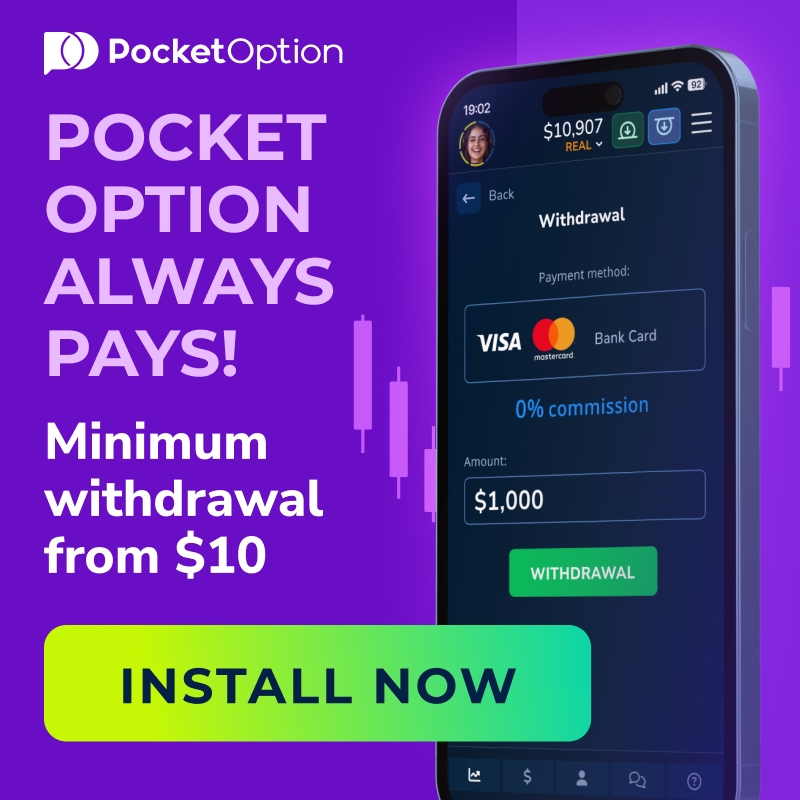
7 minute read
Pocket Option vs XM vs OctaFX: Which Broker Is Right for You?
Choosing the right forex and CFD broker in 2025 can make or break your trading experience. Pocket Option, XM, and OctaFX are three popular platforms, each catering to different trader needs. This article compares Pocket Option, XM, and OctaFX across regulation, trading instruments, fees, platforms, and account types to help you decide which broker aligns with your goals.

💥 Trade with Pocket Option now: Open An Account or Visit Brokers 👈
Overview of Pocket Option, XM, and OctaFX
Pocket Option: Launched in 2017, Pocket Option is primarily a binary options and forex trading platform. It’s known for its user-friendly interface, low minimum deposit, and high payouts, appealing to beginners and high-risk traders. However, its regulation is weaker, overseen by the Mwali International Services Authority (MISA).
XM: Established in 2009, XM is a globally recognized forex and CFD broker with over 10 million clients across 190 countries. Regulated by top-tier authorities like CySEC, ASIC, and FSA, it offers robust safety, low spreads, and extensive educational resources, making it ideal for both novice and experienced traders.
OctaFX: Founded in 2011, OctaFX (now known as Octa) serves over 42 million accounts with a focus on competitive pricing and copy-trading features. It’s regulated by CySEC, FSCA, and MISA, offering a balance of affordability and reliability but with a limited asset selection.
Quick Verdict: XM is best for traders prioritizing safety and a wide range of instruments. Pocket Option suits those interested in binary options with low entry barriers. OctaFX is ideal for cost-conscious traders seeking copy-trading and competitive spreads.
Regulation and Trustworthiness
Pocket Option
Pocket Option’s regulation by MISA raises concerns due to its less stringent standards compared to top-tier regulators. This weaker oversight means limited investor protection, which could be risky if the broker faces financial issues. Despite this, Pocket Option has built a loyal user base, with over 100,000 clients in 95+ countries since 2017.
XM
XM shines in regulatory credibility, holding licenses from CySEC, ASIC, and FSA, among others. These top-tier regulators enforce strict standards, including segregated client funds and negative balance protection. With a Trust Score of 88 from ForexBrokers.com, XM is a safer choice for traders who value security.
OctaFX
OctaFX operates under CySEC, FSCA, and MISA, with a Trust Score of 72, indicating average risk. While it has one Tier-1 license (CySEC), it lags behind XM’s four Tier-1 licenses. Nonetheless, OctaFX segregates client funds and offers negative balance protection, providing a reliable trading environment.
Verdict: XM leads in regulatory trust, followed by OctaFX. Pocket Option is the least secure due to its offshore regulation.
Trading Instruments
Pocket Option
Pocket Option offers over 100 assets, including binary options (forex pairs, stocks, cryptocurrencies, commodities) and forex/CFD trading. While its binary options focus appeals to high-risk traders, its asset range is narrower compared to XM, limiting diversification. A $1,000 deposit is required to access an extended list of 250+ assets.
XM
XM provides a vast selection of 1,394 tradeable instruments, including 55+ forex pairs, CFDs on stocks, indices, commodities, metals, and energies. This extensive range makes it ideal for traders looking to diversify across multiple markets.
OctaFX
OctaFX offers a smaller selection of 300 instruments, including 35 forex pairs, 34 cryptocurrencies, five commodities, and ten index CFDs. Its limited asset range is a drawback for traders seeking broader market exposure.
Verdict: XM dominates with its diverse instrument offerings, while Pocket Option and OctaFX cater to more niche markets (binary options and forex/crypto, respectively).

💥 Trade with Pocket Option now: Open An Account or Visit Brokers 👈
Fees and Costs
Pocket Option
Pocket Option has no deposit or withdrawal fees and supports over 30 payment methods, including crypto and local options like MoMo Pay in Vietnam. Its minimum deposit is $50, and payouts for binary options can reach 92%. However, forex trading spreads are not transparently disclosed, which may affect cost predictability.
XM
XM offers competitive spreads, starting at 0.6 pips on its Ultra-Low Spread Account, though its Standard Account spreads are higher. It ranks 33rd out of 63 brokers for fees, with a 4-star rating. XM’s fee structure is transparent, but the lack of average spread data for its XM Zero account can be a drawback.
OctaFX
OctaFX is a low-cost leader, claiming no slippage on 97.5% of orders and no overnight carry costs. Spreads vary by account type and regulatory entity, with a 4-star rating and a 29th ranking out of 63 brokers. However, its fee transparency could improve, as average spread data lacks specific references.
Verdict: OctaFX offers the most cost-effective trading, followed by XM. Pocket Option’s fee structure is less transparent for forex trading but competitive for binary options.
Trading Platforms
Pocket Option
Pocket Option uses a proprietary web-based platform, available on desktop and mobile, with features like social trading and customizable indicators. While intuitive for binary options, it lacks the advanced tools of MetaTrader platforms, limiting its appeal for technical traders.
XM
XM supports MetaTrader 4 (MT4) and MetaTrader 5 (MT5), industry-standard platforms known for advanced charting, Expert Advisors (EAs), and customization. These platforms cater to technical traders and are available on desktop, web, and mobile.
OctaFX
OctaFX offers MT4, MT5, and its proprietary OctaTrader platform, plus a copy-trading feature called Octa Space. While versatile, its platforms are less robust than XM’s upgraded MT4/MT5 offerings.
Verdict: XM’s MT4/MT5 platforms are superior for technical traders. OctaFX offers flexibility with OctaTrader, while Pocket Option’s platform is best for binary options and casual traders.
Account Types and Accessibility
Pocket Option
Pocket Option offers seven account types with a minimum deposit of $5, making it highly accessible. Accounts range from “Novice Trader” (under $100 balance) to premium options with perks like lotteries and express orders. A $1,000 deposit unlocks advanced features.
XM
XM provides four account types: Micro, Standard, Ultra-Low Spread, and Shares, with a $5 minimum deposit for most accounts. The Ultra-Low Spread Account requires $50 and offers spreads from 0.6 pips, catering to experienced traders.
OctaFX
OctaFX offers account types tailored to different regions (e.g., Europe, South Africa, Mwali), with a minimum deposit of $25. Its account structure supports MT4, MT5, and OctaTrader, with features like copy-trading and swap-free accounts.
Verdict: Pocket Option and XM are the most accessible with low minimum deposits. OctaFX’s higher entry point is offset by its copy-trading features.
Education and Support
Pocket Option
Pocket Option provides basic educational resources and 24/7 support via live chat and email. Its focus is on simplicity, but it lacks the depth of educational content offered by XM or OctaFX.
XM
XM excels in education, offering videos, webinars, seminars, and a comprehensive research section. Its support is available 24/5 in multiple languages, making it a top choice for beginners.
OctaFX
OctaFX provides decent educational materials and research but falls short of XM’s quality. Its proprietary Octa Space and copy-trading features are valuable for beginners, with 24/7 support available.
Verdict: XM leads in educational resources, followed by OctaFX. Pocket Option is less robust in this area.
Which Broker Should You Choose?
Choose Pocket Option if you’re a beginner or high-risk trader interested in binary options. Its low $5 minimum deposit, intuitive platform, and high payouts (up to 92%) make it accessible, but its weak regulation is a concern for safety-conscious traders.
Choose XM if you prioritize safety, diverse instruments, and robust education. With top-tier regulation, 1,394 tradeable assets, and MT4/MT5 platforms, it suits both novice and experienced traders seeking a reliable, versatile broker.
Choose OctaFX if you’re a cost-conscious trader who values competitive spreads and copy-trading. Its limited asset range and average regulatory trust make it less ideal for diversified or high-security trading.
Final Thoughts
Your choice between Pocket Option, XM, and OctaFX depends on your trading style, risk tolerance, and priorities. XM stands out for its regulatory strength, extensive instruments, and educational support, making it the most versatile option. Pocket Option is best for binary options enthusiasts with limited capital, while OctaFX appeals to those seeking low-cost forex trading with copy-trading features. Evaluate your goals—whether it’s safety, cost, or asset variety—and choose the broker that aligns with your needs.
💥 Trade with Pocket Option now: Open An Account or Visit Brokers 👈
Read more:



